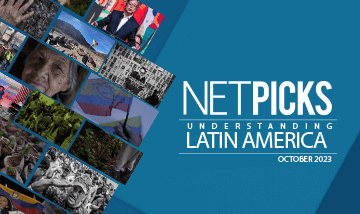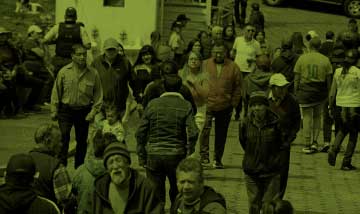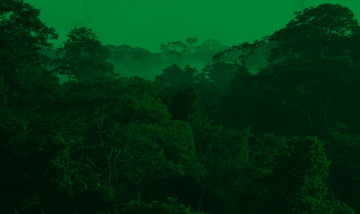Índice
- October 2nd, 2019
- INDIGENOUS COMMUNITIES VS. AMLO
- INDIGENOUS COMMUNITIES VS. AMLO: A STANDOFF AT THE TEHUANTEPEC ISTMUS
- THE STALEMATE IN VENEZUELA
- THE STALEMATE IN VENEZUELA
- WORLD’S BIGGEST MEATPACKERS
- WORLD’S BIGGEST MEATPACKERS BUYING CATTLE FROM DEFORESTERS IN AMAZON
- THE CRISIS NARRATIVE OF ECUADOR’S LENIN MORENO
- THE CRISIS NARRATIVE OF ECUADOR’S LENIN MORENO HAS OBSCURED THE REAL WINNERS AND LOSERS OF RECENT ECONOMIC POLICY
- g>UNRECOGNIZED LATIN AMERICAN ‘GRETAS’
- UNRECOGNIZED LATIN AMERICAN ‘GRETAS’ STRUGGLE TO BRING CLIMATE STRIKES HOME
Understanding Latin America
Every month we trawl the web for in-depth analysis, research summaries and opinions we think particularly worth reading, and that you won’t find in the mainstream media.
October 2nd, 2019
This month we bring you four articles from Mexico, Brazil, Venezuela, Ecuador, and one on the troubling lack of prominence of the region’s climate change activists. We touch on the Tehuantepec Dry Canal project in Mexico that will affect indigenous communities in the biodiverse Chimalapas region , the connection between Meat Packers and illegal deforestation in the Brazil, a seeming political stalemate in Venezuela despite the imposition or more sanctions, and the worsening economic situation in Ecuador where a letter of intent has been signed with the International Monetary Fund, IMF.
INDIGENOUS COMMUNITIES VS. AMLO
INDIGENOUS COMMUNITIES VS. AMLO: A STANDOFF AT THE TEHUANTEPEC ISTMUS
The Isthmus of Tehuantepec in México, a 210 mile wide strip of land between the Gulf of México and the Pacific Ocean, has long been coveted by both ‘Mexicans’ and outsiders. Both the US and the British were interested in developing a link across the Isthmus in the nineteenth century, but more recently it has been Mexican presidents that have been keen to revive the project. Present head of state, Andrés Manuel López Obrador, AMLO, is no exception, promising US President Donald Trump to take advantage of the strategic nature of the isthmus, and build a development corridor for roads, highways and a 300mph ‘bullet train’. The problem is that the land is not empty, indigenous communities will be affected by the plan to build a so called ‘dry canal’ from one side of the Isthmus to the other, and they are organizing to stop it. Many of them have managed to maintain their ancestral practices and are rightly concerned that opening up the isthmus will have devastating impacts on their lives and cultures. The corridor will also pass through Chimalapas, Mexico’s most biodiverse region with 40% of the country’s river water. The answer for some is the consultation process of OIT article 169, for others this is simply a way to incorporate the communities in the project itself. The real issue is the right to be an indigenous community, and that means land rights.
Raúl Fernando Pérez Lira, Open Democracy:
THE STALEMATE IN VENEZUELA
THE STALEMATE IN VENEZUELA
The latest round of sanctions imposed on Venezuela by US President Donald Trump will have major effects on the country. There is little doubt that life will be harder and more expensive for most Venezuelans. However, in the context of a long running dispute, for many the new sanctions are simply a matter of degree, rather than a dramatic change. Despite the worsening situation a change in the political system seems unlikely; the Maduro government walked out of negotiations with the opposition, and though efforts are under way to restart them, neither side seems willing to give way. The result is that the little faith there was in the politicians, who are seen as too polarized and not suffering the impacts of the sanctions, and in the possibility of an end to the stalemate and a consequent improvement in standards of living, has virtually evaporated.
Rebecca Hanson and Francisco J. Sánchez, NACLA: https://nacla.org/news/2019/09/12/stalemate-venezuela
WORLD’S BIGGEST MEATPACKERS
WORLD’S BIGGEST MEATPACKERS BUYING CATTLE FROM DEFORESTERS IN AMAZON
The Brazilian meatpackers JBS, Marfrig and Frigol, heavily supported by the Brazilian development bank during the PT years and now partially owned by the state, are some of the biggest meat producers in the world. Recent revelation have shown that the companies have been buying cattle from ranches associated with illegal deforestation and even slave labor; the ranches are located in the state of Pará in the North East of the country. There is an undeniable link between deforestation and raising cattle, and the Pará municipality of São Félix do Xingu, home to the greatest number of cattle in Brazil, was also first on the list of fires this year. The companies have stated their intentions to not buy cattle from ranches that are deforesting, but the ability to track where the meat comes from is far from perfect, and ranches are able to avoid detection through third parties, a practice known as ‘cattle washing’.
André Campos, Mongabay: https://news.mongabay.com/2019/09/worlds-biggest-meatpackers-buying-cattle-from-deforesters-in-amazon/
THE CRISIS NARRATIVE OF ECUADOR’S LENIN MORENO
THE CRISIS NARRATIVE OF ECUADOR’S LENIN MORENO HAS OBSCURED THE REAL WINNERS AND LOSERS OF RECENT ECONOMIC POLICY
Ecuadorian President Lenin Moreno was elected under the auspices of his predecessor Rafael Correa, but once into his term of office he began to distance himself from the former president and his policies. Focusing primarily on the public sector fiscal deficit as responsible for the country’s economic woes, with the help of the media the new head of state launched a campaign to convince the public that the country was in crisis, and the only answer was to privatize and ask for the help of the International Monetary Fund. The strategy appears to have been a self-fulfilling prophesy: the economy has not improved and government credibility has dropped to 17%. The problems with the non-oil external sector deficit have not been dealt with, and the hoped for Free Trade Agreements have not materialized. Meanwhile, tax benefits for business have increased and a tax amnesty declared, placing further pressure on the economy. The major winner appears to be the banking sector, and the country has now entered into an agreement with the International Monetary Fund, which is also focused on the fiscal rather on the production aspect.
Katiuska King, Pablo Samaniego, LSE Blogs: https://blogs.lse.ac.uk/latamcaribbean/2019/09/12/the-crisis-narrative-of-ecuadors-lenin-moreno-has-obscured-the-real-winners-and-losers-of-recent-economic-policy/?fbclid=IwAR0H3WnNw8NXoscB7r1iEYGwzToIS4VxieFLZ5mHiE2ypVicIZS-zKFpi8o
g>UNRECOGNIZED LATIN AMERICAN ‘GRETAS’
UNRECOGNIZED LATIN AMERICAN ‘GRETAS’ STRUGGLE TO BRING CLIMATE STRIKES HOME
Greta Thunberg rightly claimed the limelight at the recent United Nations summit in New York with her remarkable efforts to move world leaders. But there were other young activists from Brazil and Bolivia, amongst other places, who travelled thousands of miles to attend the Climate strike held in the same city, and play their part in the fight to change the course of Climate Change. Sadly, they and the fight for climate justice are much less in evidence in Latin America, with few people participating in marches in the region. Why this should be, given that the continent is suffering some of the major impacts of the phenomenon, is a real concern. The answers may be found in social aspects in the region, such poverty, lack of education and violence, the almost perennial context of conflict in Colombia for example, as well as the generally repressive attitude of the continent’s police forces.
Maria Paula Rubiano, Science Line: https://scienceline.org/2019/09/unrecognized-latin-american-gretas-struggle-to-bring-climate-strikes-home/





